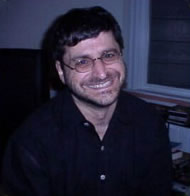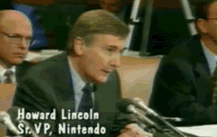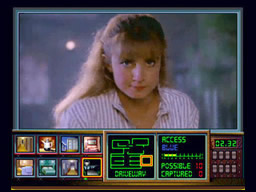No Genesis gamer worth his salt is unfamiliar with Night Trap. A game that sparked such controversy upon its release that it became partially responsible for the creation of the ERSB ratings system, the FMV adventure has been the subject of discussion for almost two decades.  Co-created by Rob Fulop (along with Jim Riley), who was the veteran programmer behind such Atari 2600 classics as Night Driver, Missile Command, Demon Attack, and Cosmic Ark (the latter two coming after he departed Atari in 1981 to form Imagic), the game has achieved an almost cult-like status since it became the center of a 1993 Senate hearing into video game violence. Fulop eventually went on to form PF.Magic, which created the acclaimed DOGZ computer pet simulation, and he is currently focused on the Internet as a platform for wide-scale distribution of future interactive entertainment experiences.
Co-created by Rob Fulop (along with Jim Riley), who was the veteran programmer behind such Atari 2600 classics as Night Driver, Missile Command, Demon Attack, and Cosmic Ark (the latter two coming after he departed Atari in 1981 to form Imagic), the game has achieved an almost cult-like status since it became the center of a 1993 Senate hearing into video game violence. Fulop eventually went on to form PF.Magic, which created the acclaimed DOGZ computer pet simulation, and he is currently focused on the Internet as a platform for wide-scale distribution of future interactive entertainment experiences.
Always one to speak his mind, especially when it concerns his most famous title, Mr. Fulop sat down for a spell with Sega-16 to chat about Night Trap and his other FMV creation, Sewer Shark.
Sega-16: First off, let me say that I’m a huge Cosmic Ark fan. Did you ever consider a sequel on more powerful hardware?
Rob Fulop: Thanks. No I’ve never considered a sequel to Cosmic Ark, but it’s a reasonable idea. There is a little story built into the game that could be much better told with today’s hardware.
Sega-16: You’re an expert in squeezing the most out of a console. Was it more difficult to realize Ballz on the Genesis as opposed to the SNES version, due to the less powerful hardware?
Rob Fulop: Keith Kirby developed Ballz for PF.Magic, so he’s much better positioned to answer this question than I am. That said, I am under the impression that both systems deal with the rendering of a sphere in similar fashions, which was at the core of Ballz. So I’d say it was probably a wash.
Sega-16: At the time of Night Trap’s release, did you see full motion video games as the future of the industry, as was purported by Digital Pictures and Sega management, or did you consider it just a new direction to explore?
Rob Fulop: Obviously, we were all excited to explore the potential of FMV games at the time. The advantages were obvious, mainly to be able to bring the player more “into” the game-world. The obvious tradeoff, mainly limitation of player “interactions” occurred to me as acceptable, but only IF the player community did not expect an FMV game to offer the same “play value” as a console game.
In other words, a game like Super Mario Bros. provided 100 hours of play, maybe more. A game like Night Trap, consisting of 80 minutes of fixed video, cannot possibly entertain somebody for 100 hours. It’s like comparing a walnut to an apple, and asking which is “better.” FMV required a different way to distribute and monetize the game … in my mind games like Night Trap and Sewer Shark worked much better as “pay per play” experience, like a coin operated game, than a $39 retail sale. If it cost $0.50 to play Night Trap, nobody would be complaining that the game became repetitive after a while.
Sega-16: You recently stated that you used network television as a guide to what you would be shown in Night Trap. Even so, Senator Joe Lieberman set off a firestorm of controversy, which eventually led to the establishment of a ratings system. Do you think his crusade was politically motivated?
Rob Fulop: Leiberman is a politician. To ask if his crusade was politically motivated is a question that pretty much answers itself.
Sega-16: Is it true that he never even saw the game himself? It did seem very convenient that he’d specifically target your game, considering that more violent and gory titles, such as Splatterhouse 2, were conveniently overlooked.
 Rob Fulop: Leiberman claimed to never having played Night Trap. The documentary Dangerous Games, which you can find on YouTube covers this area pretty well, I think.
Rob Fulop: Leiberman claimed to never having played Night Trap. The documentary Dangerous Games, which you can find on YouTube covers this area pretty well, I think.
Sega-16: Night Trap’s sales skyrocketed due to the controversy surrounding its content. So many people went and bought the game to see what all the hype was about, and a lot might not have given it a chance based on merit alone. How did that make you feel, as a developer?
Rob Fulop: Whenever a game I’ve developed becomes popular, I feel I’ve done my job well.
Sega-16: What do you think of the way Sega handled the Senate hearings? Many think it did quite well, despite the obvious leniency granted towards Nintendo (which later did a complete 180 in regards to Mortal Kombat).
Rob Fulop: The Senate brought in Howard Lincoln, then president of Nintendo, who claimed emphatically “I’d like to state that Night Trap will NEVER appear on a Nintendo system, obviously it doesn’t pass our guidelines.” This was a great example of the true meaning of the term “weasel.” I mean, it’s a joke … I was in the room when Nintendo passed on the opportunity to distribute Night Trap, because their platform could not support FMV, so Howard Lincoln was correct in stating that Night Trap “did not pass Nintendo’s guidelines,” but what he meant was that the game did not pass Nintendo’s TECHNICAL requirements. Obviously Mortal Kombat is far more violent than Night Trap ever was. In Mortal Kombat, I can maneuver my avatar to kill off my opponent in cold blood, and then reach inside his chest and EAT HIS HEART. In Night Trap, my job is to save the lives of the onscreen protagonist, and if I fail, I see her dragged off screen.
Sega-16: In 1994, you told Wired magazine, in reference to the diminishing creativity you felt kids at the time were experiencing due to video games and VCRs, “I don’t think it’s healthy. After twelve years of making these games, I’m worried about what they might be doing to kids. That’s why I want to make games that involve other human beings. I want the thing to be a relationship. That to me is more real. And, what can I say, I want to atone for the sins of Night Trap.” After witnessing the gaming industry evolve as it has over the last thirteen years, has your view changed, or do you feel your concerns still apply today?
Rob Fulop: My concerns still apply today. Video games shut down the creative process… there is less and less to “make believe.” Video games also present experiences where “you always lose.” Playing such an experience over and over and over again as a child cannot be healthy. Similarly, it wasn’t healthy for me growing up in a world of TV … where we consumed the story of “it all works out OKAY” over and over and over until we became adults and actually believed such to be the case in the world.
I’m not saying that video games are awful, only that they occur to me as unhealthy as commercial television, not more, not less. Sugar is also unhealthy, but that doesn’t stop anybody from making it, or consuming it every day. So I’m not saying that video games should not exist, only saying that one has a responsibility to your kids to limit their play, no different than not feeding them jelly beans all day long.
Sega-16: Sewer Shark, despite eventually being packaged with the Sega CD, never really took off like Night Trap did. Still, it’s a solid game, and it’s still remembered fondly by many who bought the system. Looking back, do you think the Sega CD was powerful enough to do it justice?
 Rob Fulop: Sure, there was nothing inherent in Sewer Shark that was limited by the Sega CD. The game existed within the video, and the video displayed just fine.
Rob Fulop: Sure, there was nothing inherent in Sewer Shark that was limited by the Sega CD. The game existed within the video, and the video displayed just fine.
Sega-16: The Edge-16 was one of the early Genesis attempts at bringing online play to the console, but it was never released. What happened?
Rob Fulop: AT&T was the other partner for the Edge-16, along with Sega. At the time, they were very excited about multimedia, and had committed a fair amount of money and resources to a handful of Silicon Valley startups, including PF.Magic. Then, the president of AT&T was replaced, and the new president was not so excited about picking up where his predecessor had left off, so he cancelled most everything AT&T was into regarding multimedia, including the Edge-16, which at the time was slated for production.
So, it was just bad timing, is all. Without the support of AT&T, we were sort of left high and dry at PF.Magic. We ended up turning our BALLZ technology into a digital puppy dog, and released DOGZ a year later, which saved our bacon.
We appreciate Mr. Fulop taking the time for this interview.

Recent Comments